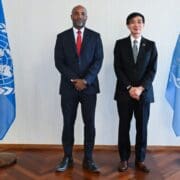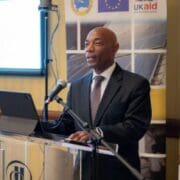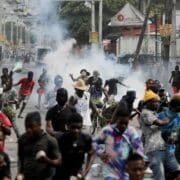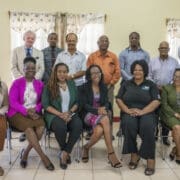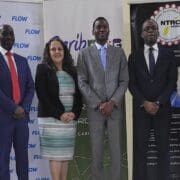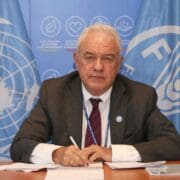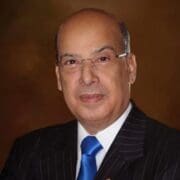Black Immigrant Daily News
The writer is Antigua and Barbuda’s Ambassador to the U.S. and the OAS. He is also a senior fellow at the Institute of Commonwealth Studies at the University of London and at Massey College in the University of Toronto. The view expressed are entirely his own.
By Sir Ronald Sanders
If developing countries, especially the small and vulnerable states, expected meaningful attention by the G20 to the myriad economic and financial challenges that confront them, their hopes were dashed by failed meetings of Finance and Foreign Ministers in February and March.
The members of the G-20 are: Argentina, Australia, Brazil, Canada, China, France, Germany, India, Indonesia, Italy, Japan, Mexico, Russia, Saudi Arabia, South Africa, South Korea, Turkey, the U.K. and the U.S., as well as the European Union. Small states have no voice at the meetings, unless one of them is invited for a brief presentation.
Both of the G20 meetings were dominated by profound differences over the Russian war on Ukraine. This caused global economic issues to be pushed to one side. The failure of the Finance Ministers meeting, on 24 and 25 February, foreshadowed the collapse of the Foreign Ministers meeting on March 1 and 2. Reuters reported that, when a Communique was being negotiated for the Finance Ministers’ meeting, Russia insisted that the document must not mention the word “war”, insisting that the fighting in Ukraine is a “special military operation.”
In any event, no Communique was issued by either of the two meetings. Instead, the Chairpersons – the Finance and Foreign Ministers of India – were forced to release short statements that did not amount to much more than saying that the major powers dug deeper into their entrenched positions on Ukraine, discarding everything else. The Indian Foreign Minister, Subrahmanyam Jaishankar, said there were “divergences” on the issue of the war in Ukraine “which we could not reconcile as various parties held differing views.”
China and Russia reportedly objected to two paragraphs taken from the previous G-20 declaration in Bali last year. The paragraphs stated that the war in Ukraine was causing immense human suffering while exacerbating fragilities in the global economy, the need to uphold international law, and that “the use or threat of use of nuclear weapons is inadmissible.” This was eminently acceptable language, particularly as all parties, including China and Russia, had accepted it a year ago.
A plea by India’s Prime Minister, Narendra Modi, in a video presentation at the opening of the Foreign Ministers meeting, fell on deaf ears. But his message was right. Importantly, he lamented that the two main goals of the post-World War II international order – preventing conflict and fostering cooperation – were elusive. “The experience of the last two years – financial crisis, pandemic, terrorism and wars – clearly shows that global governance has failed in both its mandates,” he said.
India’s hope for the year of its Presidency of the G20 meshes well with the overall interests of developing countries. It emphasizes the demands of developing states for inclusive growth, climate finance, more representative multilateral institutions, and progress on the United Nations Sustainable Development Goals, which were all reversed by the economic impact of the Covid-19 pandemic.
India’s attention to the heavy burden of debt on developing countries, and, indeed, of industrialized countries as well, is also urgent. Every country now finds it difficult to service outstanding debt, given the demands of recovering and rebuilding damaged economies.
Even before the harmful impacts of Covid-19 and the global disruption, caused by the Russian war on Ukraine, the debt to GDP ratio was already unsustainable. After these two devastating events, debt to GDP ratio in many countries soared to over 100 per cent. Now commercial borrowing has become almost impossible, given the continuing increase in interest rates.
Restructuring sovereign debt is both necessary and urgent. However, China has made it clear it will not participate in restructuring. China follows its own path, regarding money that it lends to friendly nations. And some Western countries have declared that they will not accept reducing debt owed to them, for their debtor countries to pay back China. So, while differences between major powers persisted, the interests of the developing countries at the G20 were ignored.
Climate Change should also have featured meaningfully on the G20 agenda. It did not. No discussion took place, although countries that are victims of climate change expected movement on this issue before the next Climate meeting, COP28, in December.
The fact that developing countries – despite the presence of India and South Africa – could make no impact on the major powers at the G20, is deeply troubling.
This stark reality should spur all developing countries to do more, not less. The economies of the global economy are seriously undermined by the Russian war on Ukraine and its consequences, including the retaliatory economic and other actions taken by the European Union and the member countries of the North Atlantic Treaty Organization. Developing countries lack the resilience and financial resources of the rich countries to ride out this turbulent economic storm; they cannot afford to sit by in silence.
As positions become more entrenched and more strident between the powerful protagonists of the war on Ukraine, world peace is endangered with frightening prospects for all nations, including those involved in the conflict.
In this connection, the failure of the G20 meetings raises a screeching alarm that developing countries should not ignore. If no movement was possible, even with India chairing these meetings, the clarion call for urgent collective action by developing countries should be heard by all. If ever there was a time for a revival of a genuine and practical non-aligned movement in the world, that time is now.
China, also, has an influential role to play in all this as an honest broker, taking no sides, aiding no protagonist, and promoting the established rules of the U.N. Charter and international law.
Efforts are urgent to return the world to an agenda, focused on tackling common problems such as disease and climate change; promoting human development including inequality and human rights; and engaging in dialogue to improve and enhance global rules that respect and uphold sovereignty and territorial integrity.
All developing countries should now work together, in all international fora, to present a third way to resolving global challenges, including conflicts.
Donate At Caribbean News Service, we do not charge for our content and we want to keep it that way. We are seeking support from individuals and organisations so we can continue our work & develop CNS further.
NewsAmericasNow.com

